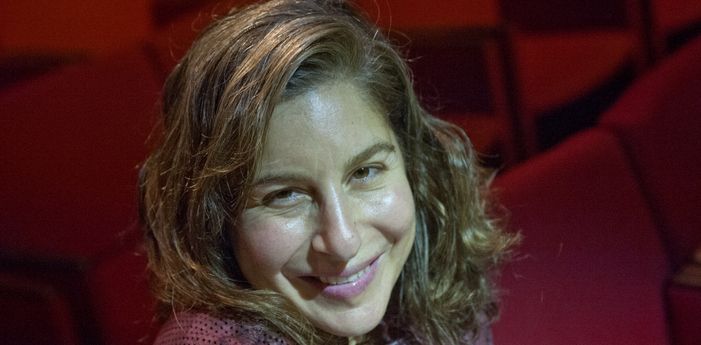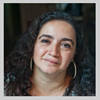‘Lübnanlı Ermeni bir müzisyen olarak mücadelem iki kat fazla’


Son iki seferdir, hayli ağır, özel anlamı olan tarihlerde İstanbul’a geldiniz. Önce 24 Nisan Anması, şimdi de Hrant Dink Ödül Töreni. Neler hissediyorsunuz?
İlk seferinde, anma dolayısıyla Türkiye’de olmanın benim için çok büyük bir sembolik önemi vardı; çünkü dedem ve ninem Türkiyeli ve burada kendimi evimde hissediyorum. Bu şehirde Ermenice şarkı söylemenin mümkün olacağını hayal bile edemezdim. Duygularım çok yoğundu. Türkiyeli Ermeniler ve Türkiyeli dinleyicilerle, hem de böylesine simgesel bir tarihte ilk kez buluşacaktım. Şimdiki gelişimi ise Nisan ayının bir devamı gibi görüyorum. Buraya bir kez daha davet edildiğim için çok sevinçliyim. Açıkçası ölmeden önce Hrant Dink’e dair çok şey bilmiyordum. Çoğu insan da bilmiyordu diye tahmin ediyorum. Özellikle de biz Lübnan Ermenileri, Türkiyeli Ermenilerden çok uzağız. Lübnan Ermenileri, soykırım tanınmadan Türkiye’ye gelmek istemiyor. Ben böyle bir insan değilim. Hep buraya gelmek ve Türkiye’deki Ermenilerle iletişimde olmak istedim. Ölümünden sonra Hrant Dink’in ifade özgürlüğünü nasıl delice arzuladığını, bu uğurda Fransa’daki soykırımın inkârı yasa tasarısını bile durdurmak istediğini öğrendim. Oysa, pek çok Ermeni bu tasarıdan çok memnundu. Ama o insanların her şeyi söyleyebilecek özgürlükte olmalarını istiyordu. Ardından eşi Rakel Dink ile tanıştım ve kendisine, eşinin mücadelesini devam ettirişine hayran oldum. Kendisinden konser için davet aldığımda da havalara uçtum. Bu vesileyle ismimin Hrant Dink ile birlikte anılacak olması, bana onur veriyor. Açıkçası bu davet, pek çok şeyden daha kıymetli benim için. Bu yıl, Ermeni Diasporası’nın en iyi yorumcusu ödülünü aldım; ama bugün bu sahnede olabilmek, bu ödülden de daha kıymetli.
Geleneksel şarkılara çağdaş, özgün yorumlar getiriyorsunuz. Bu yorum şekli, aslında sizin hayata bakışınızın da yansıması. Ermeni bir kadın müzisyen olmaktan başlayarak, tüm bu farklı kimlikleri nasıl bir arada taşıyorsunuz?
Çocukluğumdan beri hep çok seyahat ettim. Kendimi sadece Ermeni ya da Lübnanlı değil, gerçek anlamda bir dünya vatandaşı olarak görüyorum. Şarkıları Ermenice söylemeye, Paris’te yaşadığım dönemde karar verdim. Herkes İngilizce şarkı söyleyebilir, ama Ermenice için aynı şeyi ileri sürmek mümkün değil. Bu düşünceyi sevdim, benim için bir mücadele alanı olacaktı. O dönemde, bütün geleneksel Ermenice şarkıları öğrendim.
Açıkçası çocukken Ermenilerden nefret ediyordum. Ermeni olmaktan utanıyordum; çünkü bütün arkadaşlarım alay ediyorlardı. Ben de farklı diller öğrenmeye, İngiliz ya da Fransız gibi konuşmaya başladım. Kimsenin Ermeni olduğumu bilmesini istemiyordum. Ama sonra elbette büyüdüm ve çok büyük bir servet ve geleneğe sahip olduğumu gördüm. Paris sonrası tekrar Lübnan’a dönünce, Ermenice şarkıları nasıl yorumlayacağımı düşünmeye başladım; çünkü pek çok müzisyen zaten yorumlamıştı. Ama hiç kimse Ermenice rock yapmamıştı. Bu noktada diğer Ermeni sanatçılara kıyasla, daha modern bir yaklaşımım olduğunu düşünüyorum.
Albümlerimde hiç Ermeni müzisyenlerle çalışmıyorum, çünkü bir dış göze ihtiyaç duyuyorum. Eski geleneksel Ermeni şarkılarını seviyorum, ama o söyleniş halleriyle duygunun genç kuşağa geçmediğini düşünüyorum. Bense insanları modern yorumla şok etmeyi seviyorum. Bu benim karakterimde var. İlk albümümü Ermeni rock olarak yaparken, insanların hayrete düşeceğini biliyordum; ikinciyi Ermeni elektronik olarak yaparken de öyle…
Genelde neyi nasıl istiyorsam, öyle yapıyorum. Eleştirildiğimde de doğrusu mutlu oluyorum. Özellikle, insanların neyi neden beğenmediğini merak ederim. Çoğu zaman şarkıların yorumlarını geleneksel olmadığı için beğenmiyorlar, çünkü bu gibi yeni yorumlara alışık değiller, hepsi bu. O zaman alışmaları gerekecek diye düşünürüm. Ya da eğer alışmak istemiyorlarsa, o zaman da bırakalım alışmasınlar. Sorun değil.
Bu yaklaşımınız, geleneksel “Der Voghormia” ilahisine getirdiğiniz çağdaş rock yorumunu da açıklıyor aslında. Son konserde bu yorum, izleyicinin büyük beğenisini topladı.
“Der Voghormia”yı ilk olarak Lübnan’da söyledim, ama Türkiye’deki o etkiyi yaratmadı açıkçası. O konserde izleyiciler arasında Ermeni Katolik bir din adamı da vardı. Söylerken, bir yandan da ona bakıyordum. Konser sonrası yanıma gelerek “Eğer kilisede bu ilahiyi sizin söylediğiniz gibi okusaydık, eminim çok insan gelirdi” dedi. Bu benim için çok zarif bir iltifattı. Genel tepki ise beklediğimin çok üzerindeydi. İnsanların bu yorumu bu denli beğeneceğini, doğrusu hiç ummamıştım.
Sahne performansınızda kadın kimliğinizin etkisi de çok belirgin. Kadın olmak, müziğinizi ve hayatınızı nasıl etkiliyor?
Dediğiniz doğru. Sahnedeyken her şarkıyı baştan sona yaşarım ve içimde her daim bir öfke olur. Buradayım, karşınızdayım, lütfen beni hissedin der gibiyim. Ve sizin benimle birlikte hissetmediğinizi algılarsam, çok kötü hissederim. Kadın sanatçı olmaya gelince… Doğrusu hem şanslı, hem şanssızım. Bir yandan şarkılarım, müziğim, sahne performansımla istediğim mesajı aktarabiliyorum. İnsanlar genelde kadınların kırılgan olduğunu sanıyor; ama aslında kadın, erkekten daha güçlü. Sahnedeyken insanlara kadın olduğumu ve sesimle, yorumumla çok güçlü biri olduğumu hissettirmek isterim. Yani bir kadın sanatçı olduğum için çok mutluyum; ama Lübnanlı bir kadın sanatçı olmak, Ermeni bir kadın sanatçı olmak hiç kolay değil. Lübnanlı kimliğimle coğrafi olarak her şeyden çok uzağım.
Ve ne yazık ki, insanlar genelde Araplara önyargıIı. Üstüne üstlük bir de Ermeni’yim. Dolayısıyla, kadın ve sanatçı olarak iki koldan mücadelem var; çünkü uluslararası platforma çıkmam çok zor. Gerçi internet ve bazı konserler sayesinde dünya genelinde tanınıyorum, ama yine de kimliğim dolayısıyla mücadele halen zor. Ermenice söylemeye başlayınca, soykırımla ilgili birkaç parçayı da albüme almak istedim. Zira, albümümü satın alanlar, böylelikle soykırımı da öğrenecekler. Bu açıdan da ortada ikili bir mücadele var.
Ermenice şarkılarla Lübnan’dan Amerika‘ya...
Lübnanlı Ermeni bir ailenin çocuğu olarak Beyrut’ta dünyaya gelen Eileen Khatchadourian, profesyonel müzik yaşamına henüz 18 yaşındayken, 1996’da Kanadalı müzisyen Mario Pelchat’la yaptığı düetle başladı. 1997’de tanıştığı piyanist Guy Manoukian’ın 7 yıl boyunca solistliğini yaptı ve aynı yıl içinde ‘Lamma’ adıyla bir single çıkardı. 2007’de, geliri savaş mağduru Lübnanlı çocuklara bağışlanacak bir konser için Fransa’da sahne aldı. Geleneksel Ermeni ezgilerinin de yer aldığı ‘Midan’ adını taşıyan ilk albümü, 2007’nin Aralık ayında piyasaya çıktı. Bu albümüyle 2009’da 10. Ermenice Müzik Ödülleri’nde “En İyi Rock Albümü Ödülü”nü aldı. Sanatçı, ‘Titernig’ (Kelebek) adlı son albümüyle, müzik yolculuğuna devam ediyor.



